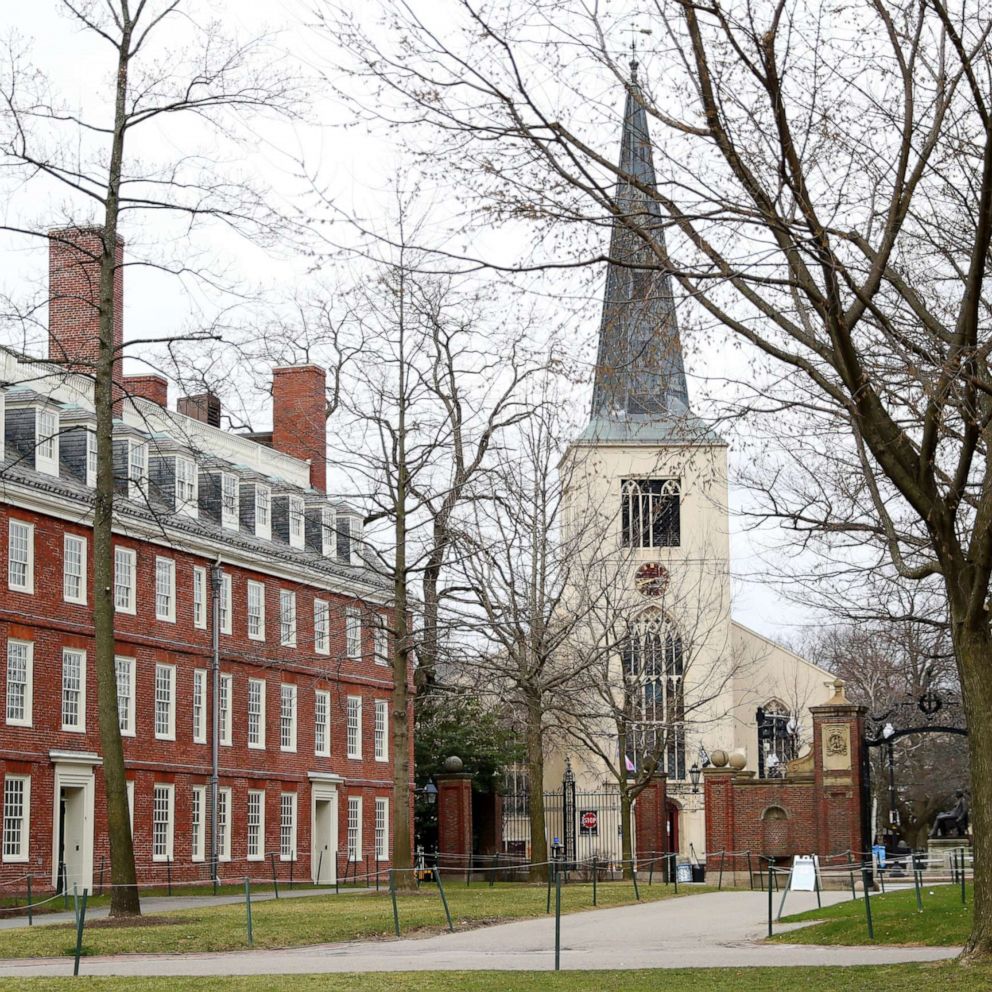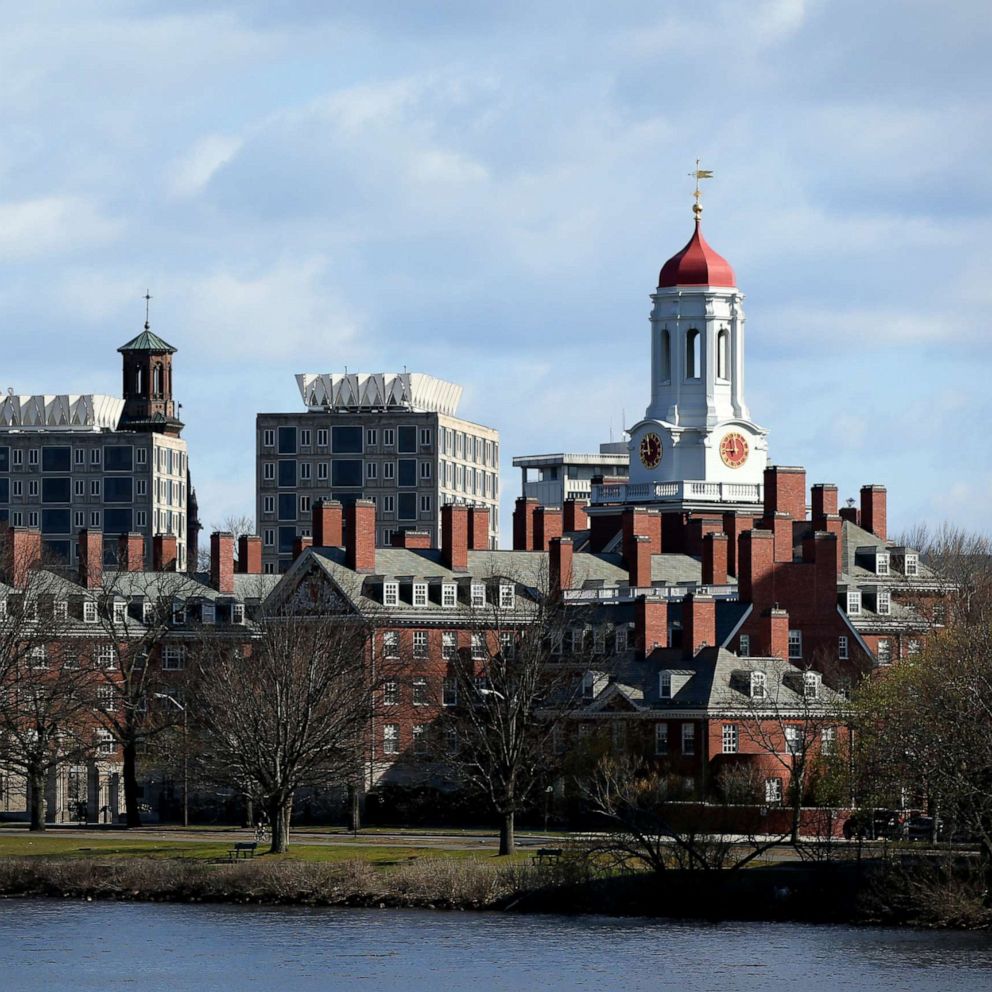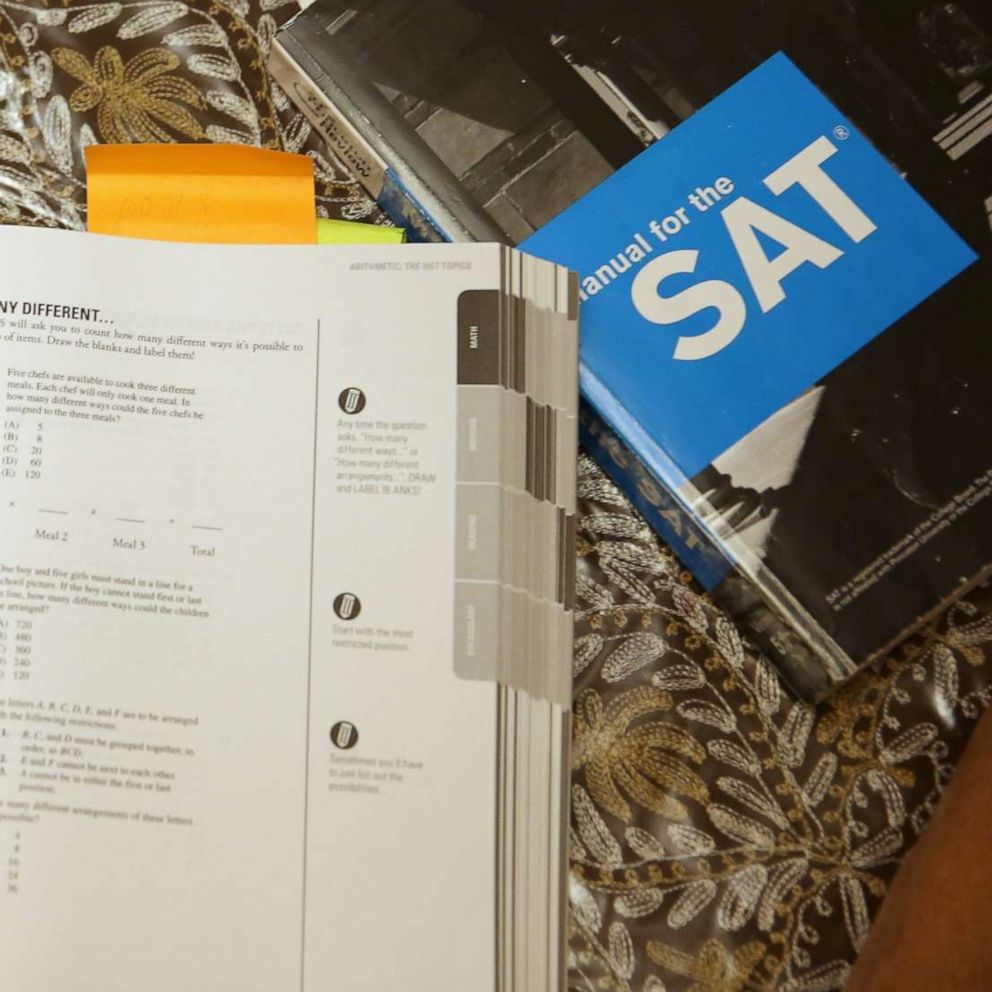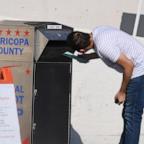College students clamor for tuition refunds after coronavirus shutters campuses
Most schools say they won't "give any tuition money back," said an expert.
Grainger Rickenbaker was more than halfway through his freshman year at Drexel University in Philadelphia when the novel coronavirus pandemic forced the school to clear its dormitories and suspend in-person instruction indefinitely.
Now at home in South Carolina, the real estate management major is taking his spring courses remotely and finding the experience lacking.
"There are two classes that aren't even using the live-lecture format," Rickenbaker said. "It almost feels that I'm just tuning in for a podcast. It doesn't really feel like the full classroom experience."
Drexel administrators informed students last month they wouldn't be on the hook for housing bills or meal plans while the campus was closed. But there would be no discounts to normal tuition rates, the university said, despite the shift to e-learning, which is ordinarily offered to undergraduates at up to 40 percent less per credit, according to rates posted on the school website.
"Faculty and staff worked diligently over the extended spring break to develop engaging teaching and learning experiences to enable students to continue their studies," reads a notice on the school's website, explaining the decision to hold onto prepaid tuition and fees.
"I'm not saying that it's their fault. I love Drexel," Rickenbaker said. "But I feel they should refund some of the money, because I feel like I'm not getting what I paid for."
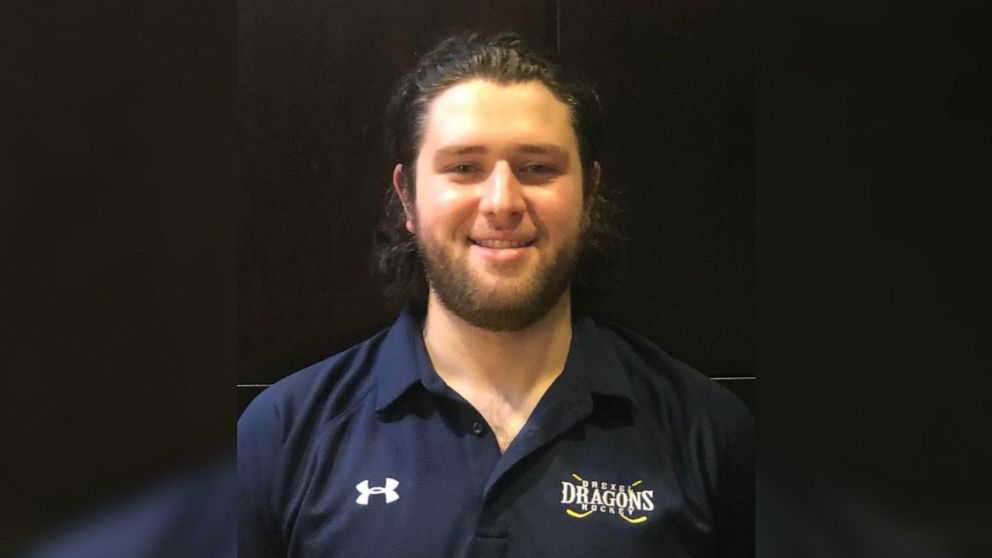
Earlier this month, Rickenbaker signed on as the first plaintiff in a class-action lawsuit against Drexel, seeking a return of fees and at least a portion of the spring tuition he paid in advance. More than a dozen other universities, including Michigan State, Columbia, Purdue, Colorado and Arizona State, are facing similar legal complaints from disgruntled students and their families, alleging there's diminished value in an isolated, virtual education.
"The university's economic challenges are no different and no more important than anyone else's," said Kelly Gibson, whose son attends Arizona State University and is one of the plaintiffs in a lawsuit against the school. "They have no right to keep money for services they are no longer providing."
A spokesperson for the Arizona Board of Regents, the governing body of the state's large public universities, declined to comment on the lawsuit.
At least eight of the new class-action complaints come from one South Carolina law firm, Anastopoulo Law Firm in North Charleston, which is using a newly-registered website, "CollegeRefund2020," to advertise its services to other potential clients.
"Are you a college student who was forced to leave campus?" reads a banner on the site's homepage. "You may be entitled to compensation."
"The only reason that colleges and universities are able to even withhold the money is the fact that they have possession of it," said Anastopoulo attorney Roy Willey, whose firm signed up Rickenbaker and other students suing their schools. "If the students had not prepaid, this would not even be a question."
Drexel declined to comment on Rickenbaker's lawsuit. But in a statement to ABC News, Niki Gianakaris, the school's executive director of media relations, said the university's "dedicated faculty and professional staff have adopted a variety of methods for delivering the academic program," and that its students "continue to have access to Drexel's broad spectrum of academic offerings and support."
Ken McConnellogue, vice president of communications for the president of the University of Colorado, said it was "disappointing, but not surprising" to learn that his school was being sued, barely a month into a fast-moving global crisis that forced higher education institutions to adjust on the fly.
"Nobody wanted to do this. Nobody hopes for a global pandemic," McConnellogue said. "The faculty across all of our campuses moved quickly to deliver courses remotely. They're working hard to ensure that they have academic rigor. And we're doing the best we can to deliver on what we promised."
Peter McDonough, vice president of The American Council on Education, a non-profit higher education advocacy group, was less charitable in his criticism of the class-action lawsuits -- particularly the claims that colleges are unjustly enriching themselves by hanging onto students' money.
"Colleges of every sort are dealing with an unprecedented fiscal crisis that swept in like a tsunami," said McDonough, a former general counsel at Princeton University. "Budgets are in shambles. Folks who claim that a school has been 'unjustly enriched' by this catastrophe are wildly out of touch with higher education fiscal reality. Count plaintiffs' class action lawyers among this crowd."
Willey, the attorney, told ABC News that his staff is "currently investigating hundreds of cases across the country for students and their families." On Sunday, his firm filed two new complaints, against Cornell and Rensselaer Polytechnic Institute, both in upstate New York.
In addition to the growing number of lawsuits, many universities -- including some of the country's most selective and expensive private schools -- are facing mounting public pressure campaigns from students to cut tuition rates during the hiatus from in-person classes. At New York University, organizers have collected more than 11,000 signatures on an online petition started by sophomore Matthew Harnick.
"We normally have access to facilities, to in-person teachers, to research," Harnick said in an interview. "The learning experience has significantly decreased."
And last week at the University of Chicago, where tuition hovers near the very pinnacle in American higher education, about two dozen students held a socially-distanced protest outside the home of the school's president, Robert Zimmer. Hundreds more have publicly committed to withholding spring tuition payments due at the end of April, if the university fails to meet demands for a 50-percent tuition rate cut for the duration of the COVID-19 crisis.
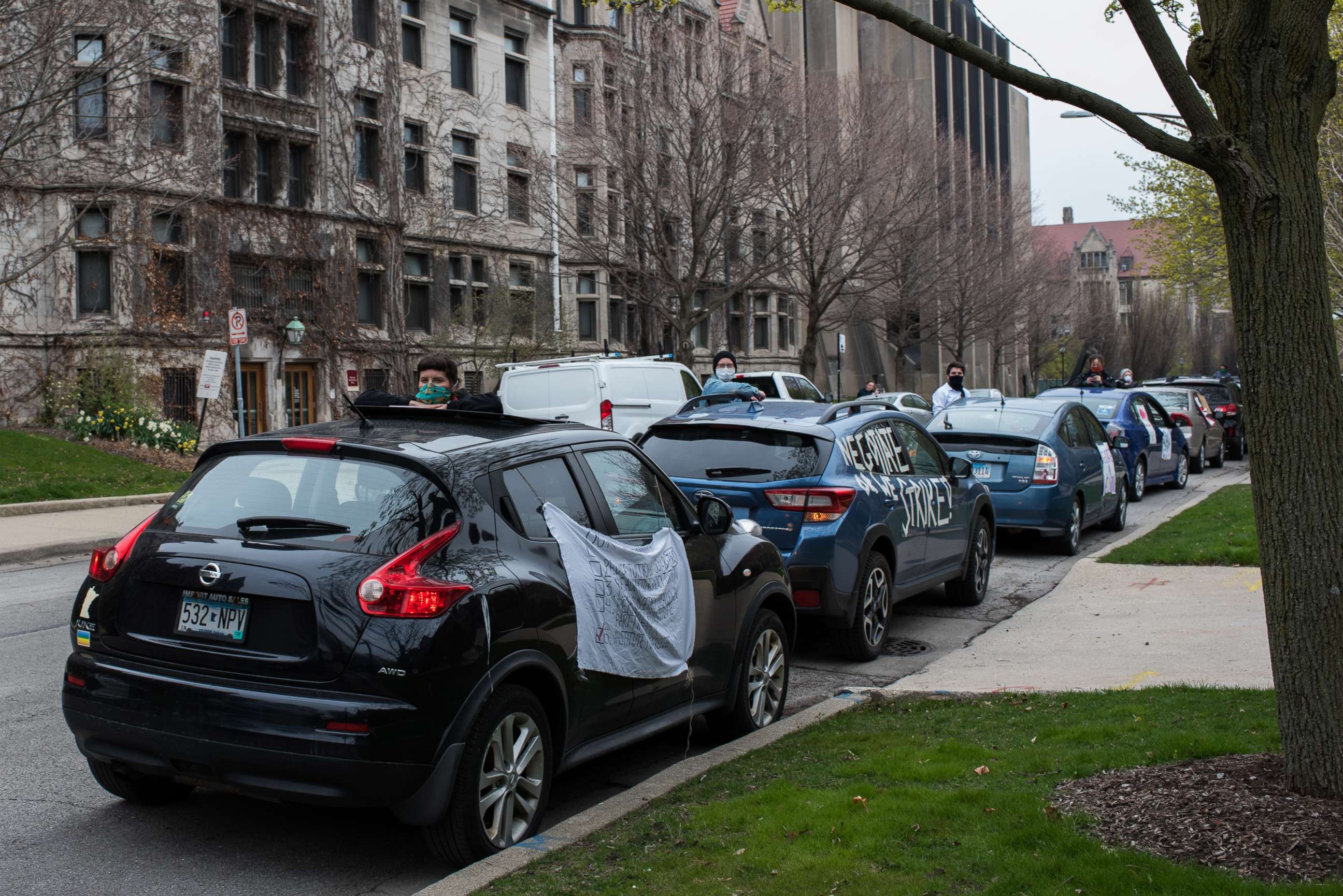
"We are in a position that's different than many other schools asking for a tuition refund," said Julia Attie, a senior who helped organize the student movement. "Because many students haven't paid yet. So we actually have the power to withhold our tuition."
In a statement to ABC News, University of Chicago spokesman Gerald McSwiggan, wrote: "Reducing tuition for students regardless of their financial means would require substantial cutbacks in operations, which would hinder the University's ability to provide all of its current educational offerings and to fulfill its core research and education mission."
NYU spokesman John Beckham told ABC News in a statement that the university had refunded prorated portions of housing and food costs, provided over $4 million in grants to support students facing financial hardship and had not laid off any of its employees. But there will be no budging on tuition, according to the statement.
"Given our commitment that the education of our students will proceed through the end of the semester and academic credit will be conferred, NYU, like most top universities, will not refund tuition," Beckham wrote.
"The private institutions, almost all of them, made the exact same decision" in response to the closure of their physical campuses, said Robert Zemsky, chair of the Learning Alliance for Higher Education at the University of Pennsylvania's Graduate School of Education. "We're not going to give any tuition money back. We're going to make remote learning possible, but we'll prorate their dorm."
But Zemsky told ABC News that no one he's been consulting with in higher education believes "that same logic will work for next year." And that's one reason, Zemsky says, why every administrator he's heard from is planning to reopen their campuses in the fall, in some form and with appropriate precautions, unless their state's governor prohibits it.
Indeed, several colleges, including the University of Dayton, American University, and Winthrop University in South Carolina, are already advertising deep discounts for on-line classes this summer.
"If you're totally remote next semester, most of these private institutions believe they will have to cut their tuition a whole lot," Zemsky said. "That just further emphasizes the need to open, if at all possible."
This report was featured in the Tuesday, April 28, 2020, episode of “Start Here,” ABC News’ daily news podcast.
"Start Here" offers a straightforward look at the day's top stories in 20 minutes. Listen for free every weekday on Apple Podcasts, Google Podcasts, Spotify, the ABC News app or wherever you get your podcasts.
What to know about the coronavirus:
- How it started and how to protect yourself: Coronavirus explained
- What to do if you have symptoms: Coronavirus symptoms
- Tracking the spread in the U.S. and worldwide: Coronavirus map
Tune into ABC at 1 p.m. ET and ABC News Live at 4 p.m. ET every weekday for special coverage of the novel coronavirus with the full ABC News team, including the latest news, context and analysis.
